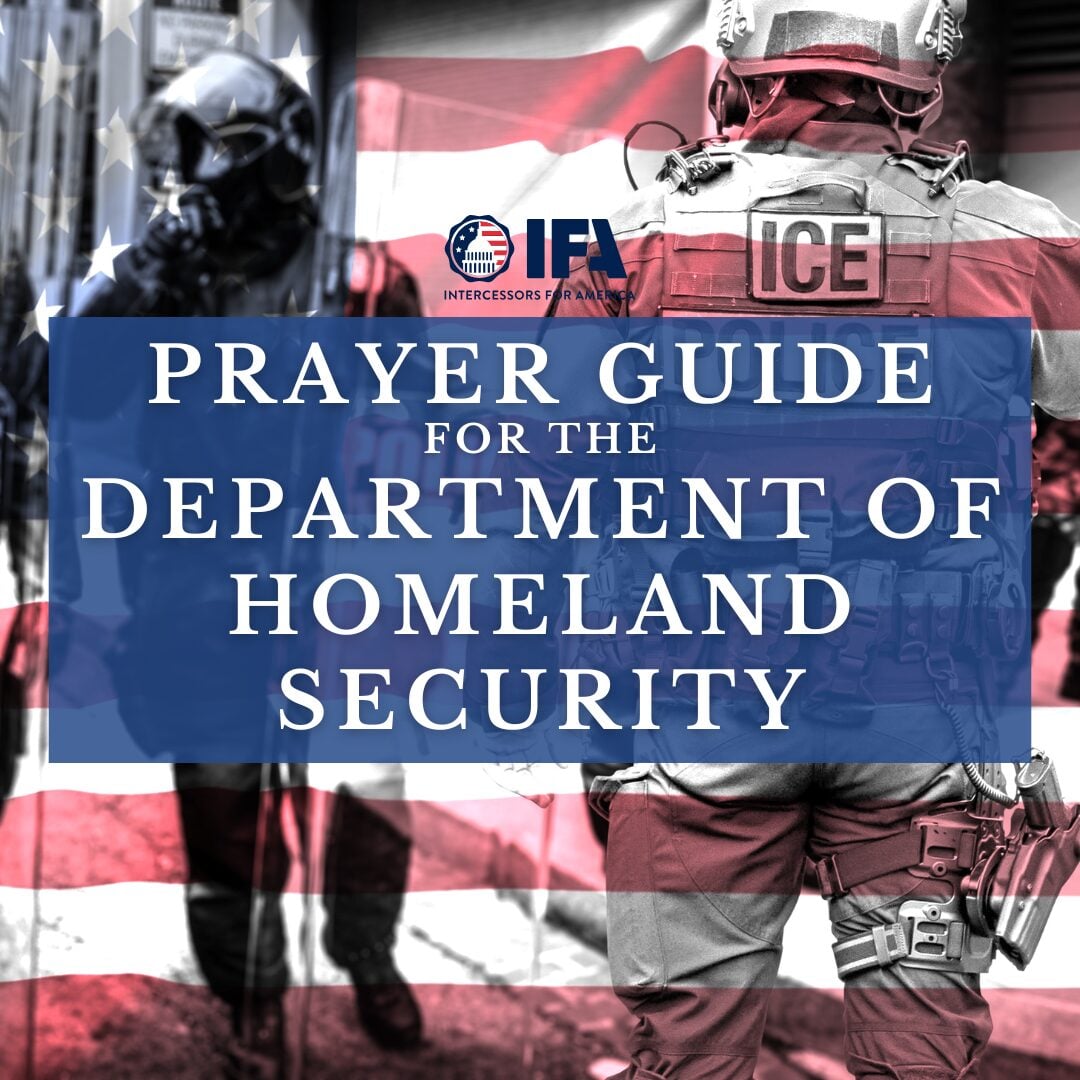Who Killed the Prayer Meeting?
Give Him 15: Love Crosses the Divide
Americans Reject Divisive Political Displays at the Super Bowl
Shining Light on the Dark World of Trafficking
Sports Gambling Is a Bad Bet
Who Killed the Prayer Meeting?
Prayer is a key spiritual discipline that has seemingly been lost in America. As we intercessors keep the fire of prayer going, let’s pray that the rest of the American church will follow.
From Crossway.
What about Prayer?
An East Indian evangelist described his first experience at an American prayer meeting. He was visiting a megachurch known, even in India, for the pastor’s outstanding preaching. He was thrilled when the pastor invited the three thousand Sunday worshipers to the midweek prayer meeting. The pastor even shared that something was “heavy on his heart” for prayer.
Do you want state prayer alerts?
The evangelist couldn’t wait. In India, the prayer meeting was the heartbeat of the church, where you stormed the heavens, often far into the night. The designated prayer chapel seated only five hundred, so he arrived early to get a seat. But at the designated 7:00 p.m. start time, he was alone. At 7:15, puzzled and still alone, he wondered if he had the wrong location, so he went outside to check the name. Yes, it was the same chapel the pastor mentioned on Sunday. Finally, at 7:30 a few people straggled in, chatting about sports and weather until the leader arrived at 7:45. The leader shared a short devotional with the seven attendees, prayed briefly, and closed the meeting.
The evangelist was stunned. No worship. No crying out to God for help. No senior pastor. What was heavy on the pastor’s heart? What about prayer for the sick, for the lost?
No one in this story thought that corporate prayer is important: not the senior pastor (he didn’t show up), the congregation (only seven came), or the prayer leader (he was forty-five minutes late and only had one brief prayer). Prayer was a mere window dressing. If you doubt something, you don’t think it works, so you don’t use it. No one here thought prayer works. Unbelief is as practical as faith.
The State of Prayer in the Church
When we descend from the formal prayer meeting down to the smaller parts of a Jesus community and into our families and friendships, we encounter the same corporate prayerlessness that the evangelist experienced. Christians are praying, but they are doing it by themselves. According to a recent Barna study, 94 percent of American adults who have prayed at least once in the last three months do so by themselves. Barna’s researcher writes:
Prayer is by far the most common spiritual practice among Americans. . . . [But] people pray mostly alone—it is a solitary activity defined primarily by the immediate needs and concerns of the individual. Corporate prayer and corporate needs are less compelling drivers in people’s prayer lives. . . . But what would it look like to begin to broaden the scope of those prayer lives? To consider the power of corporate prayer—when more than one are gathered in God’s name?
The American church is functionally prayerless when it comes to corporate prayer. Of course, a remnant does the hidden work of prayer, but in most churches corporate prayer doesn’t function in any meaningful way. How big is that remnant? In our prayer seminars, we ask several confidential questions about a participant’s prayer life. In hundreds of seminars, we’ve found that about 15 percent of Christians in a typical church have a rich prayer life. So when someone says, “I’ll keep you in my prayers,” 85 percent of the time it is just words. This isn’t a pastor problem; it’s a follower-of-Jesus problem.
The prayer meeting, which used to function at the heart of a praying church, is all but dead. Wednesday night prayer meeting used to be the core meeting, where the most dedicated, spiritual people attended; now for many, the prayer meeting itself is a distant memory. At a recent A Praying Church seminar, I asked participants what they don’t like about prayer meetings. One young man nailed it: “It’s boring.” Someone else added, “It’s depressing.” But the most poignant comment was “I don’t know where I’d go to attend a prayer meeting.” I asked the pastor of a three-thousand-attendee church if he knew of any prayer meetings in his church. He said, without a hint of concern, “No, I’m not aware of any.”
How Secularism Killed the Prayer Meeting
Which brings us to the unique challenges of praying together in much of our modern world. We are a busy, and often wealthy, people. We didn’t reach our career goals and attain the comforts we enjoy by sitting around, and yet praying together feels like we are sitting around. We can be so intent on building and producing that we don’t pause to reflect on what we are building.
Behind our busyness and wealth is a philosophy called secularism, which doesn’t just deny God’s existence but denies the existence of any spiritual world. This is strange, because every culture in the history of humanity has openly acknowledged the spiritual world. You ignored God or “the gods” at your own peril. Given this history, it would be normal for every news program to open with a prayer of thanksgiving. We don’t, of course, because secularism defines normal for us. Talking openly about God or to God feels odd.
It’s no coincidence that the prayer meeting has declined simultaneously with the rise of secularism, which sees the spiritual world as mere illusion, true for you, but not true for everyone else. That comes from the eighteenth-century Enlightenment. Immanuel Kant, the Enlightenment’s leading thinker (and regular church goer!) called prayer a “superstitious delusion” that God has no need to hear and that therefore accomplishes nothing. Kant’s god is distant, nonpersonal. Ignoring God is a far more effective than denying his existence. If you ignore him, he disappears.
Secularism remained confined largely to our universities and our elites until the rise of mass media (radio, TV, etc.) in the mid-twentieth century. Endlessly portraying a world without God and without meaning, it created a new normal. Modern agnostics are not just unsure of God’s existence; they no longer care. God is a nonissue. As one young man who’d walked away from his faith said to me, “What difference does it make?”
A Distant God
When we relegate prayer to the world of feelings, prayer becomes mere therapy. If it is simply the world of feelings, then praying together feels awkward. When you talk with someone about sports, typically your conversation feels fluid—you share a common interest, language, and knowledge. You enjoy watching football and rooting for your favorite team. You both know that sports exist. But what if everyone in your life who sounded smart and powerful, and everyone you saw on TV, told you that sports are fake, that no one is really playing, and the games you see in person are just elaborate dramas? After you’d heard this nonstop, year after year, it would get into your blood.
When we combine a prayerless church with a prayerless culture, it creates a “feelings world” where God feels exalted but distant. Then when hardship comes, God feels impotent and uncaring. This is especially true if you’ve prayed about something difficult and the heavens have been like brass. Eventually, you don’t feel anything about God. He’s merely peripheral.
Because our flat, two-dimensional world rules out prayer at the outset, spontaneously praying with friends at mealtime or on the phone feels odd. We’ve lost the fluidity of prayer that you see in children, where in one breath they are talking to you and in the next breath they say, “Thank you, God, for no bad dreams.” We’ll hear sermons on prayer, listen to a pastoral prayer, and begin meetings with prayer, but prayer seldom happens naturally in conversation. It just feels too religious.
That’s one reason why it’s a delight to fellowship with Africans or Asians, who are largely unaffected by the eighteenth-century Enlightenment. For example, for years Ugandan churches have had monthly all-night prayer meetings. They are keenly aware of the spiritual world, so prayer flows easily.
A Peculiar Danger
I went to dinner with a young pastor and his wife after one of our prayer seminars for pastors. As a homeschooling mom with three kids, this wife shared with me how she did life through prayer. Then she leaned over and asked her husband, with a puzzled expression on her face, “Isn’t that how you do church?” He shook his head. She was so surprised, she asked him again. “No,” he said. “We pray at the beginning of meetings, but it tends to be official and lack depth.”
The megachurch pastor who announced the prayer meeting as if it were a high value but didn’t show up didn’t just devalue the prayer meeting. He sent a mixed message to the congregation. His words said one thing, but his actions another. Jesus calls that hypocrisy. In the Sermon on the Mount, Jesus singles out prayer as a “hot spot” for hypocrisy (Matt. 6:5–6). There is nothing worse for a Jesus community than looking Spiritual on the outside but being hollow on the inside. Hypocrisy in leaders creates cynicism in followers.
After I’ve reflected with a group of pastors on their struggles to have a consistent life of prayer, I’ll ask, “How good are you at public praying?” They usually say, “Pretty good.” I query again, “So, what does it do to your heart to be outwardly good at prayer but inwardly bad?” They groan, because they are good men. Of course, this applies to all of us. Any time we cultivate an outer appearance of maturity but mask inward weakness, we corrupt our soul. That weakens our best gift we offer to others—a soul that walks with God.
How are you praying for a prayerful culture and a prayerful church? Share this article to encourage others to pray.
Taken from Who Killed the Prayer Meeting? by Paul E. Miller, Copyright © 2023. Used by permission of Crossway, a publishing ministry of Good News Publishers, Wheaton, IL 60187, www.crossway.org. Photo Credit: Canva.
Partner with Us
Intercessors for America is the trusted resource for millions of people across the United States committed to praying for our nation. If you have benefited from IFA's resources and community, please consider joining us as a monthly support partner. As a 501(c)3 organization, it's through your support that all this possible.


We use cookies to ensure that we give you the best experience on our website. If you continue to use this site we will assume that you are happy with it. Privacy Policy





Comments
https://www.wymt.com/2023/02/12/longest-church-service-asbury-since-1970-has-been-happening-non-stop-since-wednesday/
Tammy,
Thank you for sharing this link. Asbury is definitely blessed and a blessing to the community and world!
I am encouraged and in awe of the revival happening in KY. Asbury University has been worshipping since last Wednesday, over 5 days ago, non stop. People from all over the country are coming to experience this, and even other countries are watching. It is amazing.
https://www.wymt.com/2023/02/12/longest-church-service-asbury-since-1970-has-been-happening-non-stop-since-wednesday/
I read the article and I was encouraged. Lord touch the hearts of pastor’s to pray together as a church. Bring revival! In Jesus name amen
>When you talk with someone about sports, typically your conversation feels fluid—you share a common interest, language, and knowledge.< I think that "fluidity" is a key to prayer times that aren't boring. Even if we like sports or think them important, if we got together in a group to talk about them and had to listen to one person at a time give a monologue on his particular interest and opinions, with no opportunity for agreement, questions or other natural parts of conversation, would anyone come?
“More things are wrought by prayer than this world dreams of..”
God truly delights in our prayers Rev 3:20. God walked with Adam and Eve in the cool of the garden and when they sinned and ate of the forbidden fruit, God began with “where are you.” Not because he didn’t know where they were or what they had done. He wanted them to know that relationship with them was so meaningful to him.
Thank you. I never thought of it that way.
When I read about God calling to Adam and Eve, “Where are you?”, I don’t hear condemnation, I hear yearning.
Simply speaking all those that don’t pray and choose secularism are nothing but Rev. Billy Graham fools.
“that will be the day” JW, I stop praying daily to stay human and praise God even more in the secular world. Praise the Lord. Amen.
Praise the Lord for the 96 hour prayer meeting that’s still going at Asbury University!
Lord, may their fervor for prayer excite the modern Church!